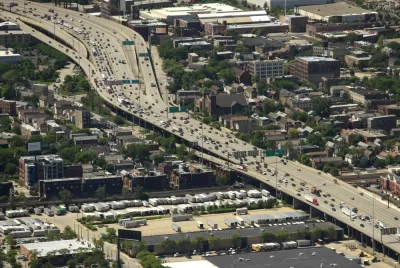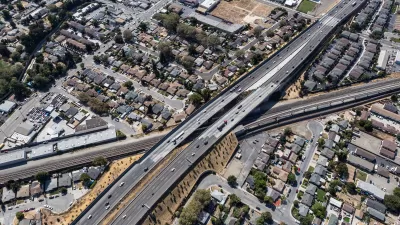To begin to reverse decades of discrimination and disinvestment, future infrastructure spending must put equity at the forefront.

In the history of highway construction in the United States, writes Denise Turner Roth, "[t]here are countless examples of vulnerable populations decimated in the name of progress and expansion." For a century or more, "infrastructure in U.S. cities has been planned, designed, and built too often without consistent and meaningful regard for the impacts on vulnerable communities, historically people of color, particularly those living in poverty."
According to Turner Roth, redressing the decades of negative impacts will take a conscious focus on equity in future infrastructure funding. "Equitable infrastructure considers the short- and long-term impacts on human health and well-being, and takes shape based on input from all members of a community. Equitable infrastructure is, at its core, defined by the principle that everyone deserves a fair opportunity to thrive."
Equitable infrastructure is critical, Turner Roth writes, for several reasons: the inequity perpetuated lasts for generations; inequity is too often invisible to many people; and inequity harms everyone, producing societal costs that ripple beyond the communities most directly affected.
Turner Roth outlines five ways to include equity in infrastructure spending that include diverse representation, consideration of outliers such as rural communities, opportunities for minority-owned businesses, nature-based solutions, and a strong understanding of the past. "Rebuilding our infrastructure today is an opportunity to do it right this time—for everyone. Without equity, our infrastructure remains broken."
FULL STORY: Why equity is critical to our future infrastructure spending

Maui's Vacation Rental Debate Turns Ugly
Verbal attacks, misinformation campaigns and fistfights plague a high-stakes debate to convert thousands of vacation rentals into long-term housing.

Planetizen Federal Action Tracker
A weekly monitor of how Trump’s orders and actions are impacting planners and planning in America.

Chicago’s Ghost Rails
Just beneath the surface of the modern city lie the remnants of its expansive early 20th-century streetcar system.

Bend, Oregon Zoning Reforms Prioritize Small-Scale Housing
The city altered its zoning code to allow multi-family housing and eliminated parking mandates citywide.

Amtrak Cutting Jobs, Funding to High-Speed Rail
The agency plans to cut 10 percent of its workforce and has confirmed it will not fund new high-speed rail projects.

LA Denies Basic Services to Unhoused Residents
The city has repeatedly failed to respond to requests for trash pickup at encampment sites, and eliminated a program that provided mobile showers and toilets.
Urban Design for Planners 1: Software Tools
This six-course series explores essential urban design concepts using open source software and equips planners with the tools they need to participate fully in the urban design process.
Planning for Universal Design
Learn the tools for implementing Universal Design in planning regulations.
planning NEXT
Appalachian Highlands Housing Partners
Mpact (founded as Rail~Volution)
City of Camden Redevelopment Agency
City of Astoria
City of Portland
City of Laramie





























